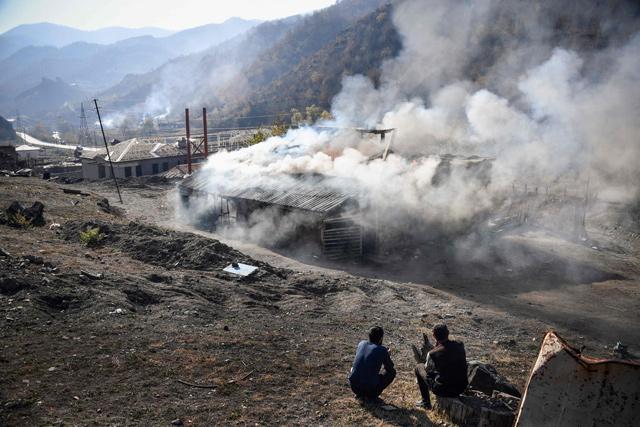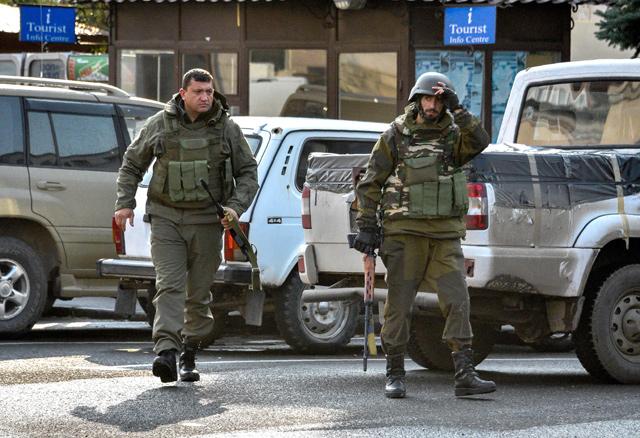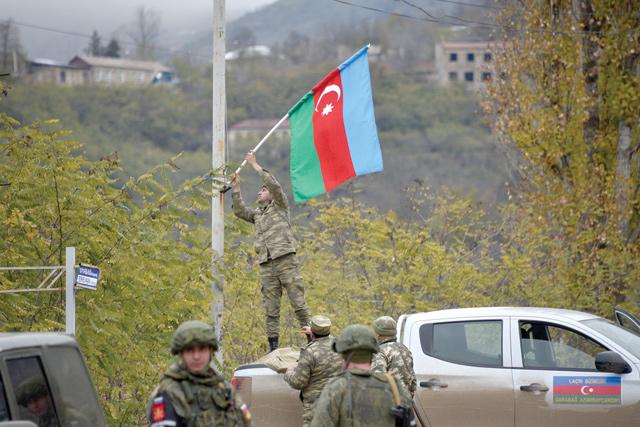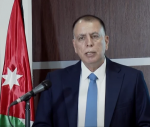You are here
Russia pledges help to Yerevan if fighting reaches Armenia
By AFP - Nov 01,2020 - Last updated at Nov 01,2020
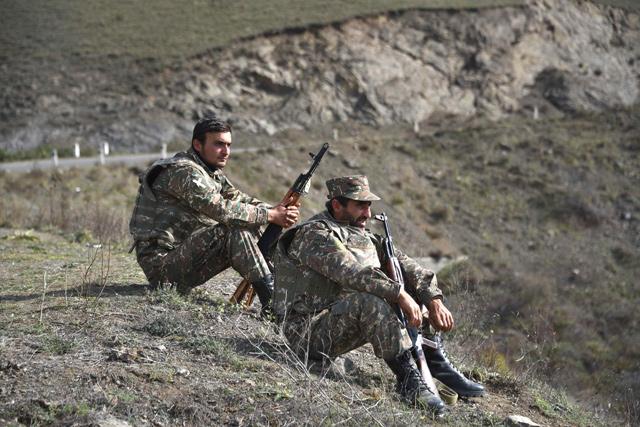
Reservists keep watch in the Shusha region on Saturday amid the ongoing military conflict between Armenia and Azerbaijan over the breakaway region of Nagorno-Karabakh (AFP photo)
YEREVAN — Russia on Saturday pledged to “necessary” help for Yerevan in the conflict with Azerbaijan if fighting reached Armenian territory, after its ally requested security assistance.
Armenia’s request for assistance from Moscow further raised fears of Russia and Azerbaijan’s ally Turkey getting sucked into a decades-old conflict over the breakaway region of Nagorno-Karabakh.
Armenian Prime Minister Nikol Pashinyan formally asked Russian President Vladimir Putin to begin “urgent” consultations on security assistance as Azerbaijani forces make gains against Armenian separatists who control Karabakh.
The request also came after Armenia and Azerbaijan failed to agree a fresh ceasefire during talks in Geneva on Friday but said they would not “deliberately target civilian populations”.
On Saturday, the warring sides accused each other of violating the Geneva agreements.
A 59-year-old villager was killed in his house in the Martuni region, Karabakh rights ombudsman Artak Beglaryan said, adding that Azerbaijan also struck the breakaway region’s main city Stepanakert and the strategic town of Shusha.
The Karabakh defence ministry said there were “wounded among civilians” in Shusha.
Baku denied shelling Stepanakert and instead accused Armenia of targeting more than 30 settlements in the Terter and other regions.
Armenia and Azerbaijan have been engaged in fierce fighting for more than a month over Karabakh, a region of Azerbaijan controlled by Armenian separatists in the wake of the break-up of the Soviet Union.
The flare-up has left more than a thousand dead.
In his letter to Putin, Pashinyan said hostilities were approaching Armenia’s borders, reiterated that Turkey was backing Baku and invoked a 1997 treaty on friendship, cooperation and mutual assistance between Moscow and Yerevan.
“The prime minister of Armenia has asked the Russian president to begin urgent consultations with the aim of determining the kind and amount of aid which the Russian Federation can provide Armenia to ensure its security,” the foreign ministry said.
Moscow’s defence pact with Armenia does not however extend to Nagorno-Karabakh, and Russia said on Saturday that “necessary” help would only be provided if the fighting reaches Armenian territory.
At the same time, foreign ministry spokeswoman Maria Zakharova said “concrete formats” of assistance to Armenia would be discussed.
Russia has a military base in Armenia’s second-largest city of Gyumri.
The Russian foreign ministry also called on the warring sides to immediately cease fire and begin “substantive” talks.
In an apparent warning to Moscow, Azerbaijani President Ilham Aliyev said on Twitter that “we do not want third countries to get involved”.
“This is a fight between us and Armenia,” he added.
Carey Cavanaugh, a former US ambassador and co-chair of the OSCE Minsk group, said Putin was aware that an expanded military engagement in the conflict was not in Moscow’s interest.
“It is impossible to calculate the risk, but injection of either Russian or Turkish armed forces at this point would mark a significant escalation of the conflict,” Cavanaugh, a professor of diplomacy at the University of Kentucky, told AFP.
At the same time, he said, “Russia could move some forces out of barracks in Gyumri to enhance border protection [they already cooperate on that] or to assist with any outflow of displaced civilian population fleeing from the fighting.”
Armenia’s rights ombudsman Arman Tatoyan accused Azerbaijan of using white phosphorus munitions and “setting fire to the forests which are next to civilian communities”. Azerbaijan denied the claim.
Azerbaijan and Armenia have been locked in a bitter conflict over Karabakh since Armenian separatists backed by Yerevan seized control of the mountainous province in a 1990s war that left 30,000 people dead.
The current clashes broke out on September 27 and fighting has persisted despite international attempts to secure a ceasefire.
The warring sides have three times agreed to ceasefires during recent talks mediated by Russia, France and the United States but the truces have all fallen apart.
More than 1,200 people from both sides have been reported dead but the death toll is believed to be substantially higher.
On Saturday, Britain announced a £1 million initiative to provide food and medicine to victims of the conflict.
Related Articles
YEREVAN — Armenia said on Wednesday it will seek to expand the presence of Russian troops on its soil in a move that would further strengthe
YEREVAN — Armenia said on Monday that fighting was continuing for the key town of Shusha in Nagorno-Karabakh, a day after Azerbaijan claimed
LACHIN, Azerbaijan — Azerbaijani soldiers on Tuesday hoisted their country's flag in the final district given up by Armenia under a peace de


